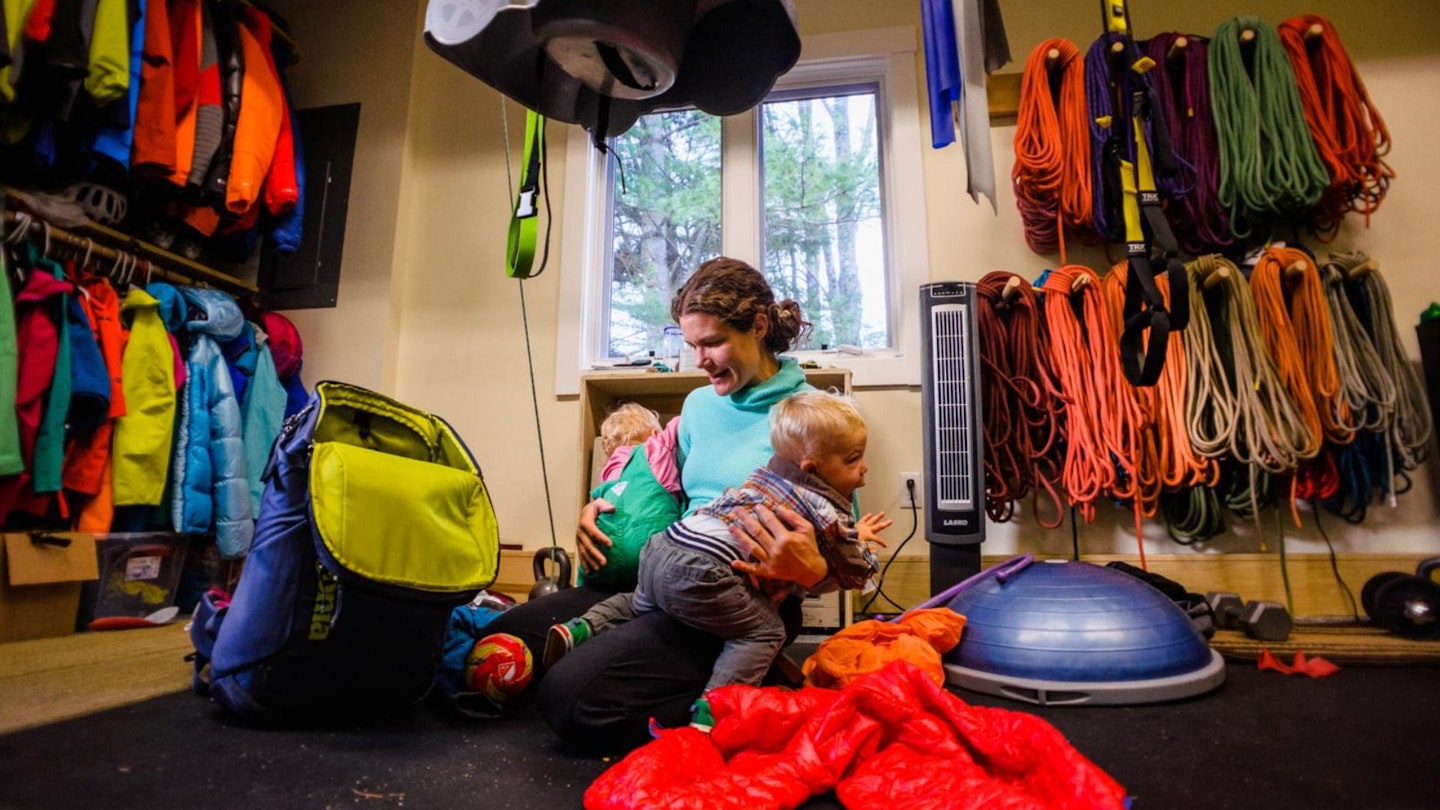“When I found out I was pregnant with twins, I remember asking how it was going to work – to have two babies and still live an adventurous life,” says Majka Burhardt. “So much of what I was told was that you just kind of ‘tuck in’ and then you come out the other side. And I was like, ‘What do you mean? What if you don't make it to the other side?’”
Majka is a professional climber, founder of a conservation non-profit, and mother to twins Irenna and Kaz. She lives in New Hampshire, USA. In part because it gives her access, within 10 minutes of home, to one of the world’s best ice-climbing arenas.
Her book, More: Life on the Edge of Adventure and Motherhood, opens with her nearly seven weeks pregnant and partway up a 152m (500ft) route on Cannon Mountain, clinging to the sheet of ice by the tips of four steel points. She has conceded the lead to her partner but will not concede the climb. “This is my sport,” she writes. “When I’m ice climbing, I feel whole.” How she is able to feel whole, or what it even means to do so while parenting, makes up the rest of the book.
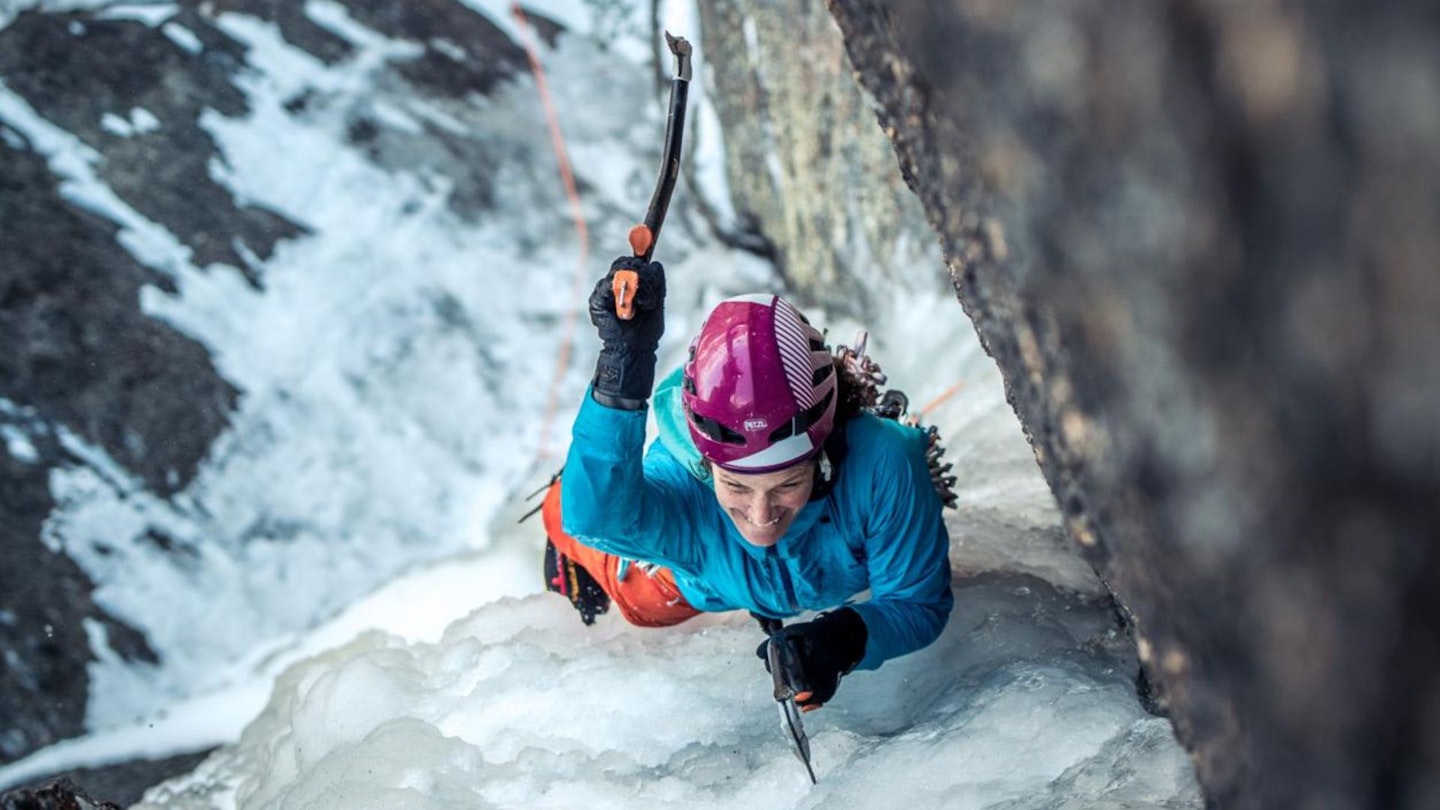
Mountaineering is the archetypal escape. It’s rarefied, exalted by its sheer distance from civilization, stark inhospitality, and the necessary stripping away of all extraneous guff. Motherhood is the archetype of home. Safe, comfortable, domestic. In this sense, it represents the very thing that mountaineering is typically construed as an escape from. And yet, since the dawn of mountaineering, parents have been climbing. What Majka – and so many others – want to know is, how on earth?
Making history
Fanny Bullock Workman was a pioneering Himalayan climber, setting a women’s altitude record when, in 1906, she reached the top of 6930m Pinnacle Peak, then believed to be over 7000m. She was also mother to two children who were cared for in schools and by nurses while she and her husband traveled the world, climbing, cycling, writing travel books, and surveying unmapped regions.
Considering herself a ‘new woman’ she rejected the social expectation of the time that she should devote herself to parenting, and devoted herself to exploring instead. But you might argue that this isn’t active parenting. In which case, let's look to Meta Brevoort and a less conventional but far more involved model.
"We have this idea that kids will merge with out lives, but sometimes they want nothing to do with it."
In 1869, Meta would have been the first woman to summit the Matterhorn had she not been driven back by bad weather. She might still have claimed the record had her plans not been leaked to rival climber Lucy Walker days before she arrived in Switzerland for a second attempt. She climbed it anyway, starting in Zermatt and descending to Breuil-Cervinia, Italy. Completing the women’s first Matterhorn traverse.
Meta never married (neither did Lucy Walker) but parenting was for her nevertheless entwined with mountaineering. When her sister became ill, she took over the care of her nephew Will. And when he was 15 and she was 40, she took him climbing in Zermatt in the hope that it would help bolster his frail health. It must have worked, at least in part, because the pair went on to climb together for the rest of her life. She died 11 years later in the midst of planning their forthcoming winter climbs.
Records of biological mothers climbing with their children are harder to come by. Almost certainly because it was so much harder to do. In 1990, Alpinist Alison Hargreaves walked into Everest Base Camp with her husband and two children before making an attempt on the mountain. But the chasm between the freedom of mountaineering and the desire to be with her children gaped. “It eats away at me,” she wrote in her diary a few years later, “wanting the children and wanting K2. I feel like I’m being pulled in two”.
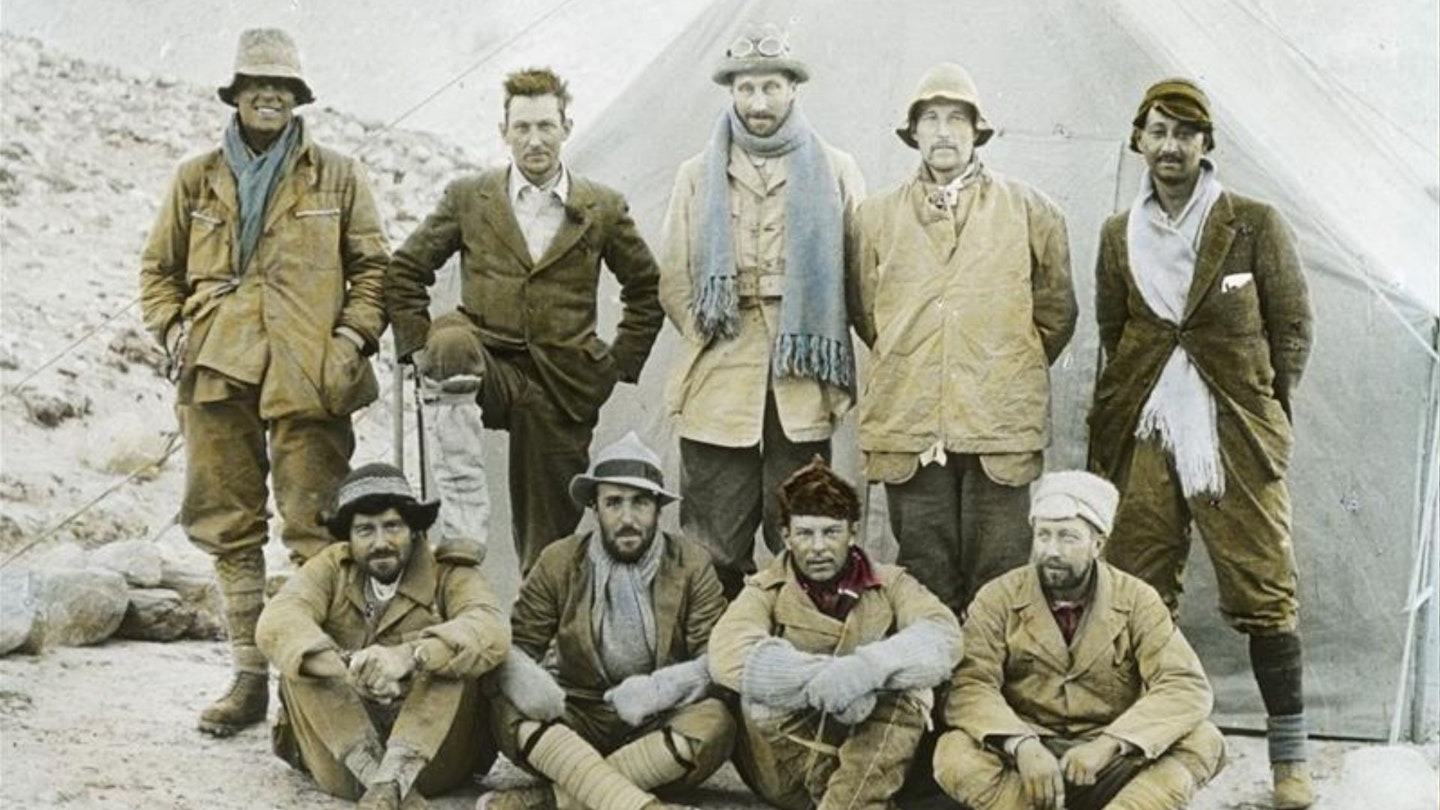
Even George Mallory, a person whose story has been told and retold until it became legend, whose name is bound to that of the mountain he so famously died on, was torn. As Wade Davis notes in Into the Silence: “The only anchor in Mallory’s life was his family, and the only endeavour at which he truly excelled was climbing.”
Mallory had three young children and had returned from fighting in WWI only two years before a position on the first British Everest expedition was offered to him. He almost didn’t go. “Initially Mallory hesitated,” writes Davis, “reluctant to leave his young family, especially his son, John, an infant of only five months.” What convinced him? Not, reportedly, the ineffable lure of the mountains, but the argument that it would be good for his career.
Alison Hargreaves too, when she was asked about climbing and parenthood in an interview, replied, “Climbing is my career. That’s what I do every day. Just like the normal working mum, she just gets on with the job.”
I mention Mallory because, so often, for men, parenting is left out of the story. Reinhold Messner too had a daughter at home when he set the recently disputed record as the first person to climb all 14 of the world's 8000m peaks. But being a dad and a mountaineer and being a mum and a mountaineer is not the same thing. It wasn’t then and it isn’t now.
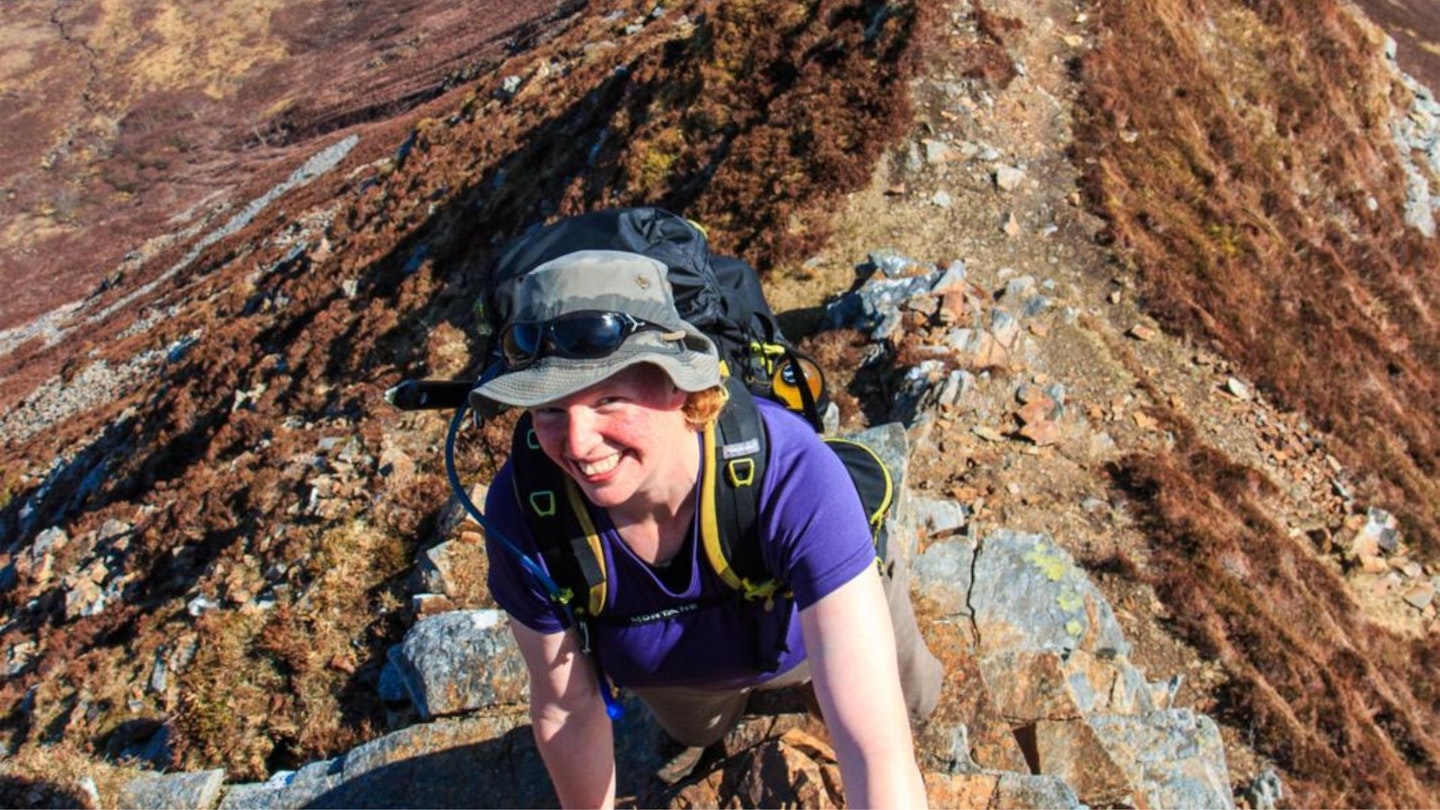
Kerri Andrews, editor of Way Makers: An Anthology of Women’s Writing about Walking, is a mother to two young children and 120 hills deep into her Munro list. “Somehow walking or climbing as a mother makes that selfishness that we all have public in a way that definitely doesn't happen for men,” she says. “I’ve read so many books by men I know to be fathers, that make no mention whatsoever of the fact that they've got children at home who must be being cared for by somebody else. There’s an ability to take for granted that of course they can still go.”
Mallory could and did go. So did Hargreaves. Both died on the mountains that called them, but only one received condemnation for their choices as a parent.
The dream
In More, a collection of diary entries and letters, written throughout her pregnancy and the first four years of parenthood, Majka is trying to work out how to possibly do the two at the same time. She and her partner, IFMGA mountain guide Peter Doucette, decide to try for a child. With one, they think, they won’t have to sacrifice too much. The kid will come with them. They can be responsible parents and live an adventurous life. She, in particular, can be a mother and still climb.
Type #hikingwithkids into Instagram and you’ll be presented with this dream of parenthood. Photographs of children on hikes, on bikes, wide-eyed babies in backpacks, and grinning toddlers squinting into the sun. It would have you believe that you don’t need to be pulled in two. “It sanitises it,” says Majka on the Instagram effect. “When that’s all you see, it makes it seem like you don't belong. There's a mismatch between those stories and what you experience at home and I think it can make people really lonely.”
The motherload
“Especially in the outdoor community, we skip to the idea of the baby coming on a hike with you,” says Majka. But that glosses over the number of tasks involved just in getting out the door, let alone whether you and the child are physically or emotionally able.
“There’s a lot of luck in there,” says Kerri, when I ask her about the possibility of maintaining an adventurous life with kids. “If you have a straightforward birth, if your body responds well to pregnancy, if you have a partner who supports you, then you’re going to have a much better chance. So many babies are born with reflux. Some are sleepers, some are not. That's just a lottery. And if you're not getting sleep, everything else just falls apart.”
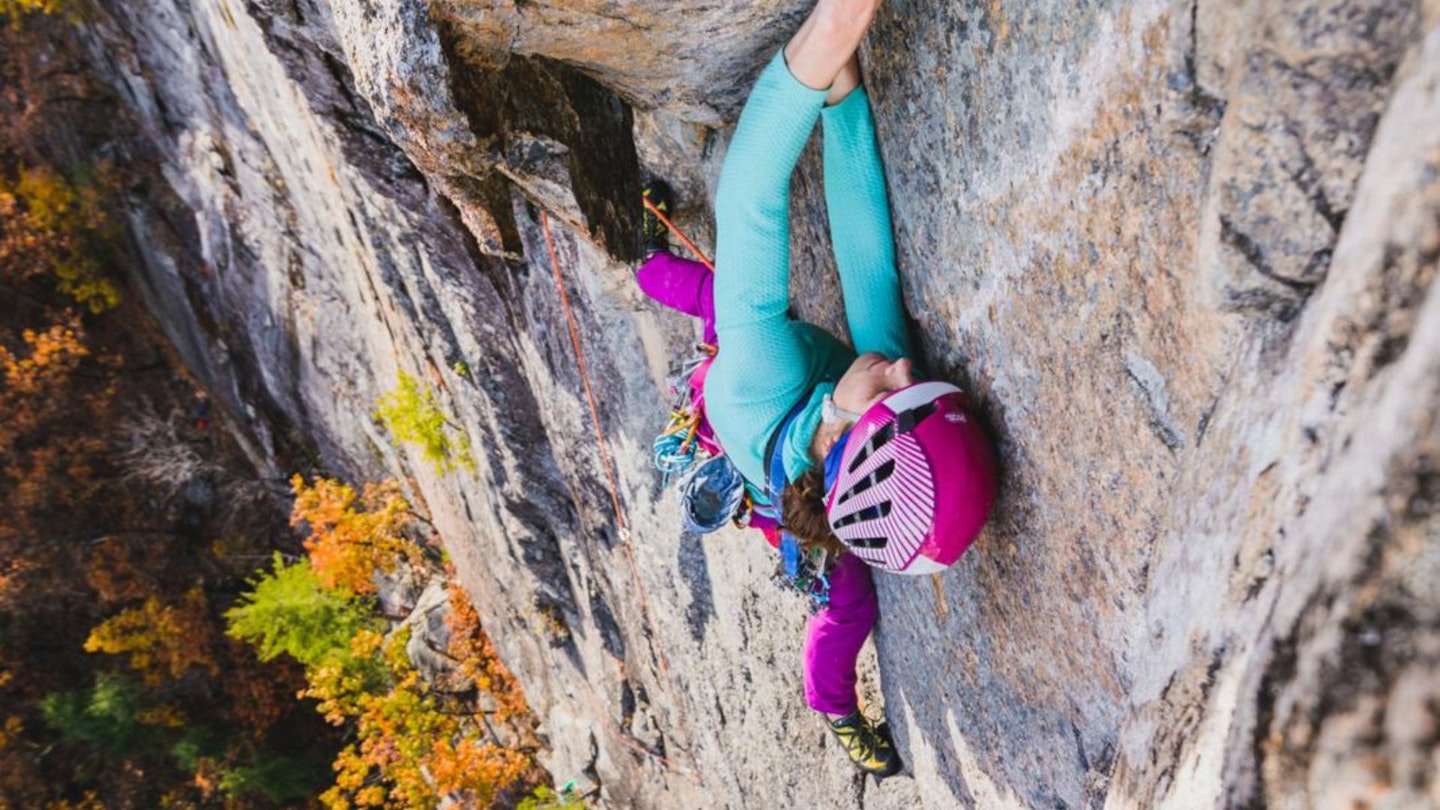
"This is a communal job,” she continues. “Until about 70-80 years ago, parenting was always communal. And the individuation of parenthood, the devastating burden of that, falls far more heavily on women than it does on men. That’s another reason why it becomes hard for women who used to be outdoorsy people to get out into the outdoors. Because they lack the community that will support that.”
In one interview with Jim Ballard, after Alison Hargreaves died on K2, he says of fathering their children: “It's often the little things that give me the problems. Like getting Kate the right conditioner and her hair cut at the right time." How is there time for mountains when there is also the washing to be done, the missing toy to be found, the breakfast to be cleaned off the floor, and the mental load of holding all of the household management in mind all of the time?
Majka concurs: “I know some women who have great support systems – usually in their extended family, sometimes in their spouse – and what that does is makes you less of a linchpin. That's what men have had forever. It feels less risky because the whole house doesn't fall down if you're not there.”
Without that community, most parents have to turn to childcare – if they can afford it. “In the book that I'm writing about parenting and walking, I decided I'm going to include at the end who did the childcare for me while I was writing and the cost of that care,” says Kerri. “The very rough total I've got is somewhere in the region of £22,000.”
"We skip to the idea of the baby coming on a hike with you, but that glosses over the number of tasks involved with getting out the door."
Taking a chance
For many women as well, there is the perception of risk to contend with. Majka deals with this in the most direct way possible. She’s an ice climber. “That’s the thing most climbers stop doing when they become parents,” she says. “But it's not as simple as not doing something because you’re a parent and it’s risky.”
Here, again, is where the ideals of motherhood (safe, secure, stable) and mountaineering (consequential, risky, thrilling) can appear to come into conflict. But, Majka argues, climbers are risk assessing all the time. “Risk isn’t linear or static. It changes depending on so many factors: emotions, nutrition, the weather… Has climbing changed since becoming a parent? Yeah, in part because I have kids, but also because I get way shittier sleep.”
There are other risks too. Those of misery and poor health and yet, depression during and after pregnancy affects more than one in ten women. This is complex, different for everyone, and rooted in various intersecting factors (social, economic, personal) but it serves to highlight the importance of helping caregivers to stay as well and happy as possible. Among the treatments suggested by the NHS is “making time for yourself to do things you enjoy”. If that’s being in the mountains, that’s good for everyone.
"Has climbing changed since becoming parent? Yeah, I get way shittier sleep."
Majka’s kids are now seven. “We're hiking, climbing, biking, and doing all these activities with the kids,” she says. “We have this idea that our kids will merge with our lives and become these great little outdoor creatures, but sometimes they want nothing to do with it.” Perhaps that’s part of the chance you take, but, looking at Majka’s Instagram grid, among the squares of sunlit kids are pictures of a woman clinging to a mountain by a pick.
“It's not just about wanting partners to take up the slack so that we can go and have independence,” she says. “It's working out how to have these conversations so we can all be full.
